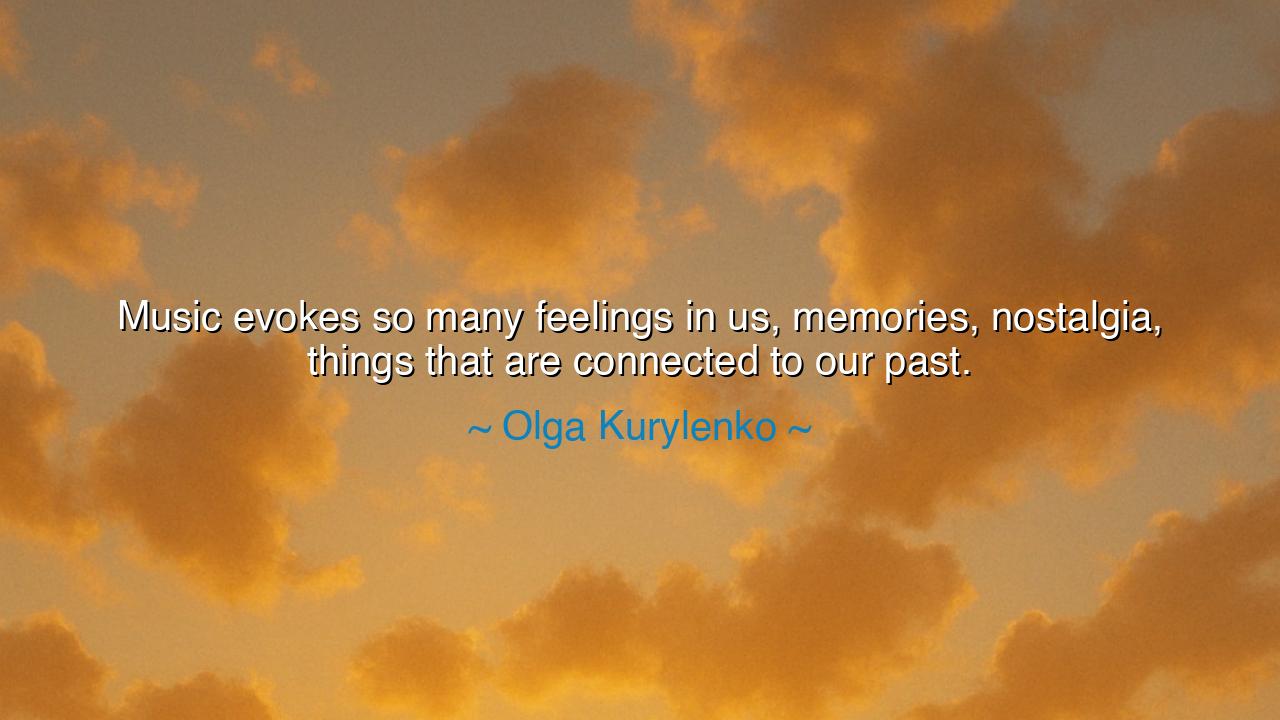
Music evokes so many feelings in us, memories, nostalgia, things
Music evokes so many feelings in us, memories, nostalgia, things that are connected to our past.






Hear the words of Olga Kurylenko, who spoke with simple truth and deep wisdom: “Music evokes so many feelings in us, memories, nostalgia, things that are connected to our past.” In this statement lies a recognition of music’s sacred power—the ability to awaken the soul, to summon visions of yesterday, and to remind us of who we are and where we have come from. For music is not only sound; it is the keeper of memory, the voice of time itself.
When she says that music evokes feelings, she reveals that it reaches deeper than reason, touching places within us that words cannot. A single melody may bring tears unbidden, or laughter without cause. A minor chord may stir sorrow; a triumphant chorus may awaken courage. Music bypasses the mind and strikes directly at the heart, as if it were a language older than speech, carried in the marrow of humanity.
She names also memories and nostalgia, for music is the bridge to the past. The song that played in childhood, the hymn sung at a funeral, the dance tune of first love—these are not just sounds, they are portals. They transport us back to moments long gone, making the past live again for an instant. In this way, music is both healer and tormentor, reminding us of joys lost and victories gained, of wounds endured and love remembered.
History shows the truth of this. During the Second World War, soldiers far from home wept when they heard songs like “We’ll Meet Again” or “White Cliffs of Dover.” These melodies did not simply entertain; they connected men to their families, to their homeland, to the hope that they might one day return. In the midst of despair, music gave them strength, because it held within it the memories of what they fought for.
The ancients too understood this. The Greeks believed that the lyre of Orpheus could move even the stones and the trees, because music touched the eternal in all things. In temples and in battles, in mourning and in celebration, music was always present, guiding the emotions of the people. This truth remains unchanged: our souls are strings, and music is the hand that plucks them, setting them to vibrate with memory and meaning.
But let us also see the hidden power of this teaching. If music connects us to the past, then it can also guide us into the future. By choosing the music we surround ourselves with, we shape the memories that will one day return to us. A song heard in hardship may become the anthem of endurance. A melody discovered in youth may forever remind us of freedom and discovery. Thus, music is not only a mirror of the past but a seed for tomorrow’s remembrance.
O children of tomorrow, take this lesson: honor the music of your life. Listen not passively, but with reverence. When a song stirs your heart, pause and ask what memory it carries, what lesson it teaches, what part of your soul it awakens. Do not dismiss these stirrings, for they are the whispers of your own story, calling you to remember and to grow.
So remember the words of Olga Kurylenko: music evokes feelings, memories, and nostalgia, binding us to our past. It is the invisible thread that ties our present to what has been, and prepares us for what is to come. Treat it as sacred, and let it enrich your life with remembrance, healing, and hope.






AAdministratorAdministrator
Welcome, honored guests. Please leave a comment, we will respond soon